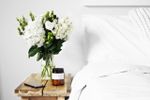Five ways to set yourself up for a great night of shut-eye.
How’d you sleep last night? Let me guess: Not well enough.
Although sleep is one of the primary human survival instincts (along with eating, drinking water and reproducing), we seem to have lost the ability to do it correctly. In the U.S., the majority of people (56 percent) say they don’t get enough shut-eye during the week, according to a poll conducted by the National Sleep Foundation. In another study, 76 percent of Americans report they feel tired at work most days of the week.
The solution to this slumber crisis? Cleaning up your act with better sleep hygiene — that is, controlling your bedtime behaviors and environment in a way that positively impacts the quality of your zzzs. One of the most effective ways to do that is by focusing on how your nightly routine impacts your senses. Here’s how.
1. Sight
Your brain naturally produces melatonin (the “sleep hormone”) in the evenings after the sun goes down. But artificial light interferes with this process, suppressing melatonin production by 50 percent. While blue light from electronics is the most villainous kind, any source of light—whether it’s your LED clock or a sliver of light peeking beneath the bathroom door—can prevent your brain from producing melatonin.
Sleep Solution:
Make your bedroom as dark as possible. Put down the phone at least an hour before bed, and opt for a book or magazine instead. If light comes in through your windows, install blackout shades or wear a comfy sleep mask to block out the light. Additionally, consider swapping your regular light bulbs for 45-watt natural-light bulbs in your bedroom to lower the total amount of wattage and use the night shift mode on your phone, if it has one, to dim the blue light.
"The most important tweak you can make for better sleep is to lower the amount of light in your room."
2. Sound
After sight, sound is the second most important sense to consider for proper sleep hygiene. Whether it’s a snoring partner, a noisy heating system, sounds from outside or the television you neglected to shut off before dozing, any kind of ambient noise can disrupt your sleep.
Sleep Solution:
It may sound counterintuitive, but it can actually help to add some noise to your environment — the relaxing kind. Invest in a white noise machine or download an app that emits a soft, static-like sound (like gentle ocean waves or quiet rainfall) scientifically shown to help drown out unwanted sounds and promote better sleep.
You can also go the route of blocking all sound by wearing earplugs — go for a foam or silicone pair labeled with a noise reduction rating (NRR). It’s also a good idea to ban watching TV in your bedroom altogether.
3. Touch
Your sense of touch is a crucial element of sleep hygiene. From the temperature of the room to the quality of your sheets, the way your bedroom feels can make or break your sleep. Translation: Transform your bedroom into the coziest, dreamiest, most relaxing place you’ve ever slept.
Sleep Solution:
Invest in the highest quality bedding you can afford. Read reviews online, ask your friends, and shop in person so you can get a sense of how bedding really feels. Luckily, there’s no need to rush out and buy an entirely new mattress; an affordable pillow-top mattress cover can make a big difference. (If you’ve had the same mattress for more than seven years, however, it’s probably time for a new one.)
Also, consider swapping out your pillow for one that fits your sleeping style. While there’s no right or wrong choice, a firmer pillow might work best for side sleepers, flatter pillows help support head-and-neck alignment for on-the-back sleepers, while stomach sleepers usually prefer a very soft pillow.
Finally, when it’s time for bed, turn down the thermostat. Your body temperature tends to drop to help it wind down for bed, so a cool atmosphere naturally induces a feeling of sleepiness.

4. Smell
Your olfactory system, which enables your sense of smell, is even more powerful than you might realize. And because some aromas are energizing and others are relaxing, they can greatly impact how fast you fall asleep and how well you sleep overall.
"Soothing scents include lavender, Buddha wood, vetiver, rose, vanilla and chamomile."
Sleep Solution:
Certain smells have been scientifically shown to potentially reduce anxiety, agitation and even pain — all good for inducing sleep. The most soothing scents include lavender, buddha wood, vetvier, rose, vanilla and chamomile, many of which can be found in our Relax Essential Oil line of self-care products. On the other hand, uplifting smells, such as peppermint or lemon, should be avoided right before bed.
Diffuse or mist a relaxing scent in your bedroom or mix one with a carrier oil (such as jojoba or coconut) and massage it into skin to welcome in tranquility.
5. Taste
Super spicy or garlicky foods can cause sleep-disrupting digestive issues, as can foods that are particularly high in fat since they can take up to six hours to digest.
Sleep Solution:
The perfect nighttime nibbles combine carbs and protein. Think: hummus and crackers, an apple and almond butter or cheese and a slice of whole-grain bread. Including some calcium in the form of dairy in your bedtime snack is smart, since calcium helps the brain convert the amino acid tryptophan (found in many proteins) into melatonin. You can also sip a cup of tea with calming ingredients, such as chamomile, lavender, passionflower and valerian.




